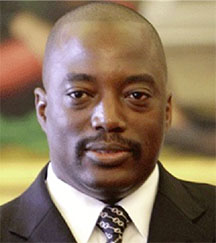KINSHASA, (Reuters) – The expiry of Congolese President Joseph Kabila’s second mandate next year, a crucial test of governance, risks exposing the limitations of Western donors trying to promote democracy and transparency in return for the billions they have spent on aid.

At issue is Kabila’s future; opposition activists as well as Washington and other Western countries fear he is seeking ways to extend his tenure beyond a constitutional limit, in the manner of many African leaders before him.
U.S. President Barack Obama personally called Kabila on Tuesday, urging him to organise timely, credible and peaceful elections and think of his legacy, the latest of many appeals.
Yet, when a U.S. diplomat was briefly detained along with 40 activists and journalists at a pro-democracy event co-sponsored by the U.S. embassy this month, the government was unrepentant, saying the Democratic Republic of Congo was “not a sub-prefecture of the United States”.
“The government has sabotaged all the donors’ efforts and programs for governance reform,” said Thierry Vircoulon, central Africa project director for International Crisis Group (ICG). “The deep reason for this: the maintaining of a kleptocratic governance is key to Kabila’s survival.”
The dilemma for Western donors is clear: Can they attach political strings to a $3 billion a year international aid programme that accounts for almost all the humanitarian spending in a country that ranks 186th out of 187 countries on the U.N. Human Development Index and has an average life expectancy of 50 years?
FEARS OF CIVIL WAR
In private comments, they also say that any precipitous cuts in financing for a U.N. peacekeeping mission could allow civil conflict to reignite, with memories still fresh of a war in 1998-2003 war that sucked in half a dozen neighbours and cost millions of lives.
But political frustration is also rising in Congo, although the government says that, under Prime Minister Augustin Matata Ponyo, it has improved accountability and reduced corruption.
Foreign powers did succeed in February in helping to persuade the government to release a calendar for local and national elections over the next two years.
Kabila has refused to comment on his political future, though a spokesman has said that he intends to respect the constitution.
He took office in 2001 after the assassination of his father, and won disputed elections in 2006 and 2011. He is constitutionally required to step down after an election scheduled for November 2016.
But at least 40 people died in violent protests in January against a proposed law that would require a national census before the next election – a move that opponents said was intended to delay the vote.
Activists in Kinshasa and the eastern city of Goma have accused authorities of intimidating them to silence criticism.
“The only crime of these young compatriots is of being conscientious citizens, engaged and peaceful, and of having had the idea of debating about democracy and good governance,” said the pro-democracy youth organisation Lucha.
“TREATED LIKE ANIMALS”
In the streets of Kinshasa, many feel not enough has been done to spread the wealth from a mining boom, concentrated in the hands of a small elite, among the population of 68 million.
“We Congolese, and especially the young people, want the country to change,” said Ange, a money changer in the Barumbu commune. “The government treats us like animals.”
Matata, however, says strong economic growth of 9.5 percent last year is starting to be felt by the general public through advances in infrastructure, agriculture and education.
Yet, unlike other African countries such as Ivory Coast and Angola that have put civil wars behind them to focus on growth, Congo is still battling dozens of armed groups in the east.
The United Nations has for now ruled out drawing down any of the 20,000-strong U.N. peacekeeping mission, MONUSCO.
“(The Security Council members) are concerned … that if we reduce very, very fast, maybe the situation will be irreversible,” said the mission’s head, Martin Kobler.
But that force, too, finds itself outmanoeuvred by Kabila.
MONUSCO last month paused its support for government military operations against a Rwandan rebel group in the east, after Congo put two generals suspected of repeated human rights violations in top posts.
Kabila refused to remove the generals, instead summoning close to two dozen diplomats to the presidential palace to chastise them for interfering in sovereign affairs, and the operation is now going ahead without U.N. support.
“By doing nothing but supporting the status quo,” ICG’s Vircoulon said, “the international community sends a signal of powerlessness to Kabila.”
